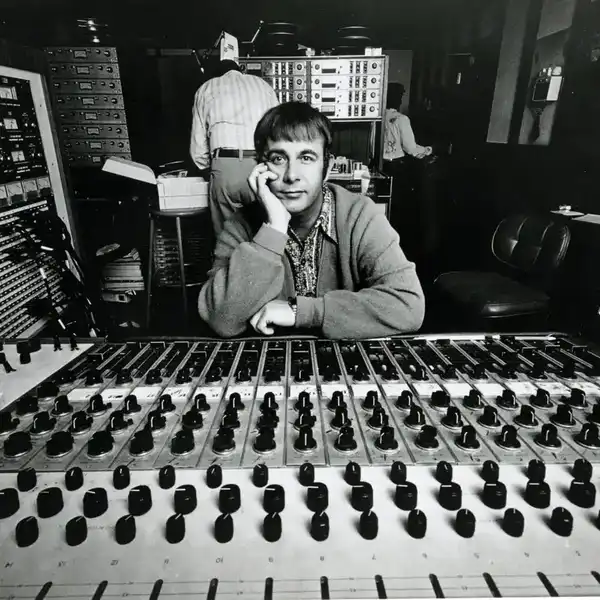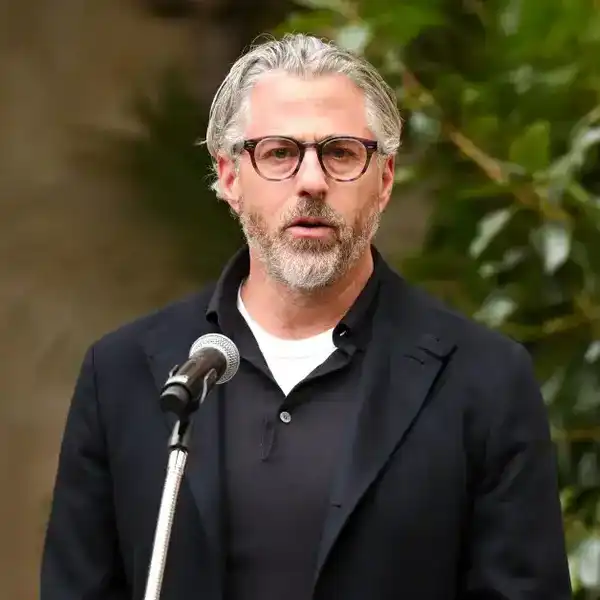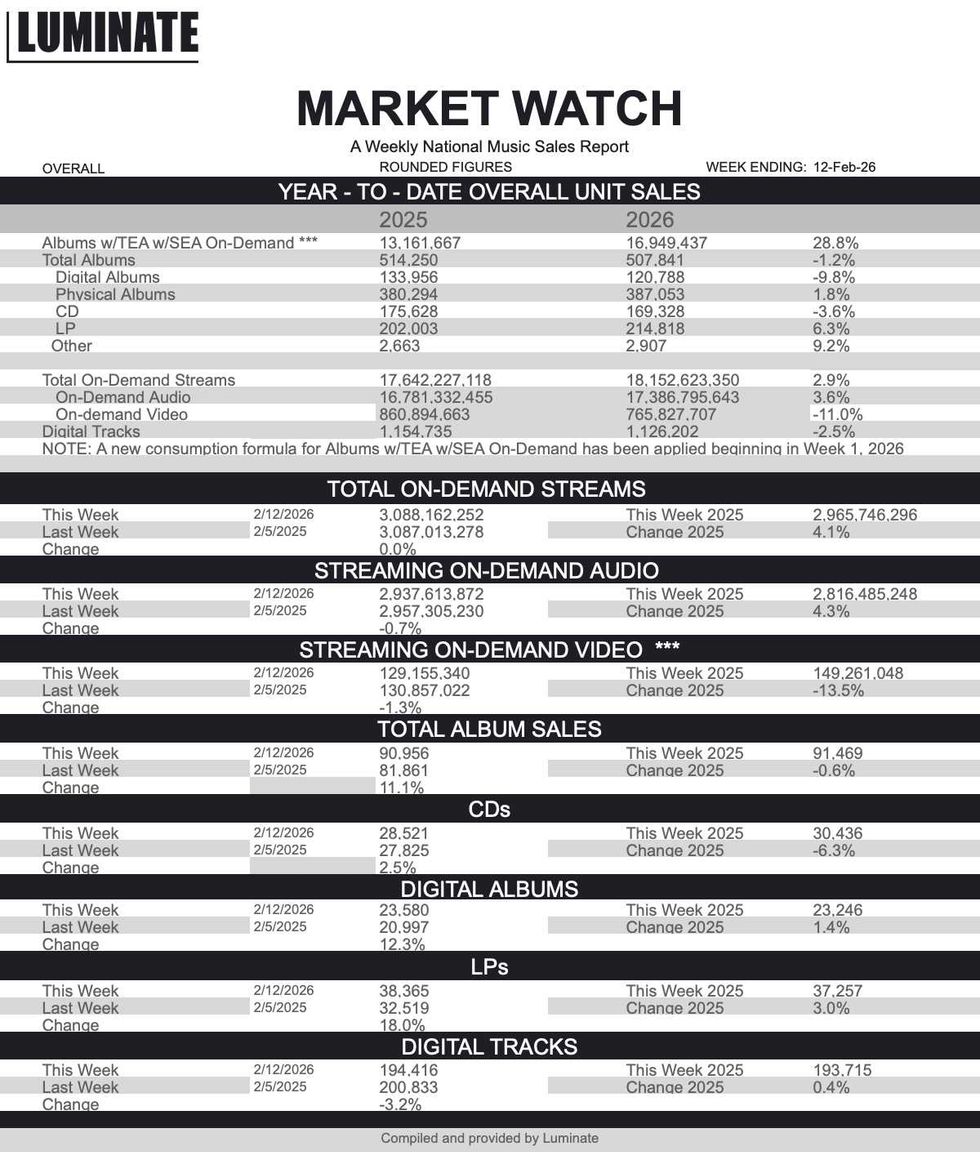Music News Digest, Feb. 15, 2020
The CLMA launches the #ForTheLoveOfLIVE campaign (pictured), Warner Music Canada dumps Matthew Good, and BC Entertainment Hall of Fame inductees are named. Also making news are Folk Unlocked, Laila Biali, Justin Bieber, Winterfolk, Miesha and The Spanks, MusicNL, Swagger Rite and Roy Woods, Haviah Mighty, HRL, and Wavelength, and farewell Denny Christianson, Skippy Snair, Louis Clark, Chick Corea, Rupert Neve, and Russ Thyret.

By Kerry Doole
Launched last week, the Canadian Live Music Association's #ForTheLoveOfLIVE campaign has been met with an enthusiastic response. It is designed to bring awareness to the major challenges the pandemic continues to present for musicians, crew, venues, music industry pals, and live music fans, and to ensure that live music remains at the forefront of recovery conversation. #ForTheLoveOfLIVE asks music lovers to assist by sharing their favourite live music memories, concert videos, and photos on social media, using the #ForTheLoveOfLive hashtag.
In a press release, Erin Benjamin, President and CEO of the CLMA, notes that "Real people in your community are at risk of losing their jobs forever. They need additional, ongoing targeted support from governments to ensure that when Covid measures are lifted, Canadians continue to have access to the artists and live music experiences they know and love.” More info here
– The 2020-2021 BC Entertainment Hall of Fame inductees have been announced. Named as the 2020-21 StarWalk Stars are film and TV producer/writer Walter Daroshin and South Asian screenwriter, producer, and director R. Paul Dhillon. The 2020-21 StarMeritus Stars are acclaimed acoustic guitarist Don Alder, actor/singer, arts advocate Candus Churchill, Juno-winning performing rights pioneer Lynne Partridge, and manager/producer/entertainment publicist, Valerie ("Valley") Hennell. More info here
– Warner Music Canada has "parted ways" with Matthew Good after allegations of abuse were made public online earlier this month. The platinum-selling BC rocker was accused of being a "serial abuser" by a former girlfriend, Toronto-area model and music producer Hayley Mather, Global News reported. Mather claims she has been approached by many other women with similar stories of abuse and mistreatment, though this has not been confirmed. In response to the allegations, Warner Music Canada shared a terse statement on Feb. 11 which reads, "Warner Music Canada has seen the recent allegations against Matthew Good and take them very seriously. We have parted ways with Matthew Good." Bernie Breen Management, which formerly handled Good, has also severed ties, informing Global News that it “no longer represents Matthew Good. No further comments and/or statements will be made.”
Good is the latest in a growing list of Canadian artists whose behaviour has had major career and/or legal repercussions. Hedley frontman Jacob Hoggard is awaiting trial on sexual assault offences, The Dead South's cellist Danny Kenyon left that band last year after allegations of misconduct surfaced online, and last June country star Chad Brownlee was dropped from Universal Music Canada after posting an anti-Semitic image online. Simple Plan bassist David Desrosiers quit the band last year after allegations of sexual misconduct, while Quebec star Bernard Adamus was dropped by his label, Dare to Care, for the same reason. Back in 2017, Crystal Castles member Alice Glass accused her bandmate Ethan Kath of mental, physical, emotional and sexual abuse, including rape, leading Kath to file a defamation lawsuit against Glass, a case dismissed in 2018.
– ECMA, Music/Musique NB, MusicNL, Music NS, Cape Breton Music Industry Cooperative & Music PEI have joined forces to present the Canadian Music East Coast Style Spotlight at the 2021 Folk Alliance International Conference, Folk Unlocked. The virtual edition of the annual conference runs Feb. 22-26. The two East Coast showcases, on Feb. 23 and 24, feature Les Fireflies, Kylie Fox, Christine Melanson (NB), Ian Foster & Nancy Hynes, Jeff Pittman, Rum Ragged (NL), Jennah Barry, Terra Spencer, Villages (NS), Inn Echo, Shane Pendergast and Atlantic String Machine (PE). The Spotlight Showcases will take place Feb. 23 and Feb. 24 from 5:30 pm - 6:30 pm (EST).
– Justin Bieber played his first-ever TikTok concert on the weekend. He performed songs fron his 2013 digital-only compilation album Journals as part of his Journals Live From The Drew House live-stream on Valentine's Day, Feb. 14, in the US. Bieber- who has 19.6 million followers on TikTok - said before the show "Journals is one of my favourite projects and I’ve never performed it live. I’m grateful to TikTok for helping me to bring this show to everyone on Valentine’s Day." Source: Female First
– Now in its 19th year, popular Toronto folk and roots music fest Winterfolk is going virtual, for the first time, presenting free live-streamed performances on Feb. 19 and 20, 7-10 pm. The impressive artist lineup includes Julian Taylor, Jack de Keyzer, Ken Whiteley, Laura Fernandez, Melanie Peterson, Mandy Goodhandy, Donne Roberts, Diana Braithwaite and Chris Whiteley, Ariana Gillis, Suzie Vinnick, Q&A (Tony Quarrington and Zoey Adams), and Sue and Dwight. Registration to watch is free (sign up here) , and optional donations will be collected in support of the Daily Bread Foodbank.
– Calgary-based rockers Miesha and The Spanks have just released a new single, I Want Fire. It’s a preview of what’s to come in Singles EP out on April 16, the follow-up to their critically acclaimed 2018 LP Girls Girls Girls (produced by Danny Farrant of punk legends The Buzzcocks). Of note: The new track was produced by noted roots-rocker Leeroy Stagger.
– MusicNL welcomes the following directors to its Board: Mary Beth Waldram, Krista Vincent, Nigel Jenkins, Lindsey Wareham, Amy House, Marlene Cahill, David Smallwood, Théa Morash. Chair is Amy House.
– Toronto rappers Swagger Rite and Roy Woods have put out the official video for their new track Drugs & Love. The video serves as the directorial debut for Woods, and the clip was edited by Zac Facts (Jessie Reyez, Wiz Khalifa, Future). Drugs & Love will be featured on Swagger Rite’s forthcoming EP, The Detour, out later this year.
– Juno-winning jazz pop artist Laila Biali has made no secret of her deep love of the music of Joni Mitchell. She has just covered Mitchell’s classic love song, A Case Of You, fittingly timed for Valentine’s Day. This video captures a live performance of the song at Toronto’s Revolution Recording studios, with Biali accompanied by her husband, Ben Wittman, and George Koller.
– Polaris Music Prize-winning Toronto artist, Haviah Mighty has released a new song and video, Obeah. Mighty produced the song alongside her brother, Mighty Prynce, while the video features a cameo appearances by her father, who is sampled on the tune.
– Though currently without a physical venue, Toronto's Hugh's Room Live remains active. In conjunction with The Empire Club of Canada, HRL has assembled a panel of leading Canadian musicians to honour Black History Month. The event, which will be zoomed free thanks to sponsor Meridian Credit Union, takes place at noon on Feb. 25. Moderated by Rudy Blair, it features Ron Westray, Molly Johnson, Dan Hill, and Jully Black discussing the history of black music and its impact on North American music generally and the way it impacted their own work. Register here
– Toronto’s famed indie festival Wavelength is presenting its Winter Festival in partnership with Harbourfront Centre’s Kuumba. Night One live-streams on Feb. 20 (7-10 pm) with a potent lineup comprising Polaris Prize winner Backxwash, Zoon, and Maryze. Register for the event here.
RIP
Denny (Dennis Richard) Christianson, a Canadian jazz trumpeter, arranger, composer, bandleader, and educator, has died, at age 78. He had Parkinson’s disease and later suffered complications from leukemia.
Born in Illinois, he studied at the US Navy School of Music in Washington, DC, played 1971-5 at Harrap's Casino in Lake Tahoe, Nev, and worked 1975-80 as a trumpeter and arranger in Los Angeles studios before moving in 1980 to Montreal at the behest of Diane Dufresne. He later became a Canadian citizen.
In Montreal, Christianson continued to play and write for studio orchestras, and he taught 1983-4 at the University of Montreal, 1986-7 at Concordia University, and 1988-90 at McGill University. He has been an important figure in the stageband movement in Quebec and in 1986 began to lead the CFQR (later CHAD) All-City Stage Band. Christianson's arrangements have been recorded by Dufresne, Jano Bergeron, Jean Lapointe, Ginette Reno, Véronique Sanson, Martine St-Clair, and others.
In 1981 he formed the 18-man Denny Christianson Big Band, whose repertoire has comprised works by US composers as well as Christianson's own pieces. The band appeared annually 1982-91 at the FIJM, and on occasion accompanied such performers as Ginette Reno, Michel Legrand, Shirley Bassey ,and Diane Schuur.
It performed at festivals in Europe and across Canada. In 1986 the US baritone saxophonist Pepper Adams recorded as a guest soloist with the band. The group was nominated for a 1986 Juno Award for the album Doomsday Machine.
He appeared on more than 250 albums and inspired generations of Canadian jazz students along the way through his work at Humber College in Toronto.
In 2001, he became the director of music studies at Humber College, where he made a lasting impression on the past, present and future of jazz in Canada. He retired in 2018, and became president of MusicFest Canada, Canada's largest student educational festival.
“Denny was a driving force in Canadian music and Canadian education,” wrote famed saxophonist Pat LaBarbera. Sources: JazzFM, Canadian Encyclopedia
– Skippy (Warren Douglas) Snair, a popular veteran of Montreal’s music and broadcast community, died on Feb. 11, reportedly of a heart attack, at age 75.
In the ‘70s, Snair welcomed April Wine when the band moved east from the Maritimes, and he worked as a self-described ‘fixer ‘at Donald K. Donald Productions. He was also, for a short time, assistant to Rolling Stones tour manager Peter Rudge. He went on to work with Evenko and, for a long period, at Astral Media Radio’s CHOM 97.7. He was a promotions and marketing exec there, most recently as Director of Marketing.
Some of his comrades reminisce about Snair in this TSN radio interview. Sources: Facebook, Linkedin, TSN
International
Louis Clark, a musician who conducted and arranged the orchestral music for the Electric Light Orchestra in the ’70s and later introduced pop music to the masses with the quirky Hooked on Classics series, died on Feb. 13, at age 73. No cause of death was revealed but Best Classic Bands reports "he had been ill for months and had suffered from kidney issues."
Where preceding records had built orchestral sections with overdubs, ELO mastermind Jeff Lynne opted to live up to the band’s name when he hired Clark as string arranger and utilized a full orchestra in the group’s recordings.
Beginning with 1974’s Eldorado and its big single, Can’t Get it Out of My Head, Clark conducted the strings and co-arranged the music with Lynne and ELO keyboardist Richard Tandy. Their collaboration continued with 1975’s Face the Music (Evil Woman, Strange Magic), for which Clark also began to work on the choral arrangements; 1976’s A New World Record (Livin’ Thing, Do Ya, Telephone Line); 1977’s two-LP set, Out of the Blue (Mr. Blue Sky, Turn to Stone, Sweet Talkin’ Woman), 1979’s Discovery (Don’t Bring Me Down, Shine a Little Love), and the 1980 soundtrack for the film, Xanadu.
Clark then created a series of albums that offered uptempo disco-fied pop treatments to classical songs. The series, Hooked on Classics, first introduced in 1981, was a huge success. The title cut, a medley of such compositions as Rimsky-Korsakov’s Flight of the Bumblebee and George Gershwin’s Rhapsody in Blue, was an unlikely pop hit, reaching #10 on the Hot 100, #2 in the UK and Top 10 in many other markets. The album, on RCA Records, reached #4 on the Billboard 200 Albums chart. It was marketed via K-Tel’s ubiquitous TV commercials and reportedly sold ten million copies. Its success led to multiple follow-ups.
During his career Clark also contributed string arrangements on such recordings as Ozzy Osbourne’s Diary of a Madman and Roy Orbison’s final album, Mystery Girl.
Since 2000, among other endeavors, Clark has also performed with The Orchestra, which features former members of Electric Light Orchestra and ELO Part II. Source: Best Classic Bands
Chick (Armando Arthur) Corea, a pianist, keyboardist, and composer who was among the most popular and successful and influential jazz musicians of all time, died February 9. He was 79.
His death was announced in a post on his Facebook page, which stated that Corea had died of “a rare form of cancer which was only discovered very recently.”
A giant of the jazz world, Corea became a superstar in the mid-1970s as the leader of the fusion ensemble Return to Forever.
Corea was instrumental in developing the fusion subgenre, working with Miles Davis on several seminal recordings before forming his own band; he was among the foremost voices of electric piano in jazz.
Among other accomplishments, Corea was a perennial Grammy nominee, collecting more than 60 nods over his career and winning 23 awards. In his long career, he recorded close to 90 albums as a bandleader or co-leader.
However, his career cut a far wider swath. Nicknamed “The Chameleon,” Corea was associated with bebop, avant-garde, classical, big-band, and Latin jazz. He had a special affinity for the lattermost, extending its reach to include the rhythms and harmonic inflections of Spain. Indeed, that country gave its name to Corea’s best-known composition, Spain.
Throughout his career he never abandoned his first love, the acoustic piano, on which his punctilious touch and crisp sense of harmony made his playing immediately distinctive.
Corea was also known for his collaborative efforts. A member of Miles Davis’ “lost” quintet of 1969–70, he enjoyed a long-term creative partnership with vibraphonist Gary Burton, with whom he recorded the 1972 classic Crystal Silence (and its 2008 sequel The New Crystal Silence), among many others. He also took part in a lengthy series of duet performances with Herbie Hancock.
“My mission has always been to bring the joy of creating anywhere I could,” Corea said, as quoted in the social media post announcing his passing. “And to have done so with all the artists that I admire so dearly—this has been the richness of my life.”
Corea was born in a Boston suburb, and started playing the piano at age four. As a teenager, he played professionally at parties, weddings, and other social events around the Boston area. He studied at the city’s famed Juilliard School in 1960, but soon dropped out in favour of playing live jazz.
He soon found work with Latin-jazz artists Mongo Santamaria and Willie Bobo, then accompanied Sonny Stitt, Stan Getz, Herbie Mann and Hubert Laws, and had a brief stint with Art Blakey’s Jazz Messengers.
He made his own debut recording in 1966 with Tones for Joan’s Bones; his next album, the 1968 trio recording Now He Sings, Now He Sobs became a jazz classic.
That same year, Corea joined Miles Davis’ pioneering quintet, appearing on Davis’ albums Filles de Kilimanjaro, In a Silent Way, Bitches Brew, and Jack Johnson.
His next project was a free-jazz collective called Circle that also featured saxophonist Anthony Braxton, bassist Dave Holland (Corea’s colleague from Davis' “lost” quintet), and drummer Barry Altschul.
In 1972, drawing on the electric experiments with Davis, Corea formed a new ensemble that brought Latin and Brazilian elements to the head of that context. Return to Forever, the new band, was Corea’s breakthrough success; over three incarnations, it was able to fill large-capacity theaters and even some arenas and had four consecutive records crack the Top 40 on the Billboard 200.
During this period, he continued working with Circle, recording solo albums including the acclaimed My Spanish Heart, and participating in duo projects with Burton and Hancock.
After Return to Forever’s disbanding in 1978, Core remained as active as ever. The 1980s found him returning to progressive acoustic jazz, both under his own name, and with a trio he called the Akoustic Band plus its companion, Elektric Band, enabling Corea to continue in his fusion vein as well. He also pursued his love of classical music, composing a number of concerti and string quartets in the early and mid-1990s.
The late ’90s found Corea collaborating with bassist Christian McBride. The two would work together frequently over the next 25 years in various configurations, including Corea’s “SuperTrio” with drummer Steve Gadd, and his Five Peace Band with John McLaughlin, Kenny Garrett, and Vinnie Colaiuta.
McBride and Corea also joined with drummer Brian Blade on the pianist’s project Trilogy, whose album Trilogy (2013) won a Grammy Award for Best Instrumental Jazz Album (the follow-up, 2020’s Trilogy 2, is nominated for a 2021 Grammy Award.) In 2006, Corea was named an NEA Jazz Master. Sources: JazzTimes, Paste, NY Times
– Rupert Neve, a pioneering designer of audio recording equipment that revolutionized the industry, died on Feb. 12, of non-COVID pneumonia and heart failure, age 94.
Often credited as “the man who made the recording console,” Neve is best known for designing and producing microphone preamplifiers, equalizers, compressors and mixing consoles that are sought after in the industry. His designs are staples everywhere from large production facilities to home studios, and have even been reproduced as computer plug-ins to become more accessible for all music lovers and creators.
Born in Newton Abbott, England, in 1926, Neve spent much of his childhood in Argentina. At the age of 17, he volunteered to serve in World War II and worked as part of the British Army’s communication support personnel.
In 1961, Neve founded his own company, Neve Electronics, along with his wife, Evelyn. In 1964, Neve built a transistor-based mixing console for Phillips Recording Studio in London, then became immersed in the world of designing and producing audio equipment.
He invented the Neve 50 and Neve 80 mixing desks, and later incorporated microphone preamplifiers, equalizers and processing modules to those models, developing a distinct sound. Neve’s equipment — particularly the Neve 8028 console — can be heard on classic recordings, including by The Who, Santana, Fleetwood Mac, Chicago, Earth Wind & Fire, The Grateful Dead, Tom Petty, and more. The Neve 8028 console is also celebrated in Dave Grohl’s 2013 documentary Sound City, which features an in-depth interview with Neve.
Neve also invented the world’s first moving fader system, NECAM, integrating digital technology into the recording process. His Neve 1073 preamplifier is used widely in the industry as well as replicated in software plug-ins.
In 1975, Neve and his wife sold Neve Companies and established ARN Consultants and later Focusrite Ltd., continuing to produce large-format mixing consoles and outboard equipment. In 1994, the couple moved to Texas and in 2005, they established Rupert Neve Designs.
In 1997, Neve received the Lifetime Achievement Technical Grammy award and earned an Audio Engineering Society Fellowship award in 2006. Sources: Variety,
– Russ Thyret, one of the top executives during Warner Bros. Records’ golden age of the 1970s and 1980s, died on Feb. 12, after a long illness, at age 76.
Over the course of his 30-year career with the label, Thyret climbed the ranks from sales, marketing and promotions posts — eventually heading all three departments — culminating in a run as chairman/CEO from 1995 to 2001. Warner was the only record company Thyret ever worked for.
The famed executive signed Prince to the label (after being brought a demo by his then-manager Owen Husney and local Minneapolis promotion man Clifford Siegel) and was also a noted early champion of Madonna.
When Thyret was named Chairman/CEO in 1995, his predecessor Mo Ostin said of him, “Russ is a total record man — brilliant, experienced and well-rounded in every aspect. He is eminently qualified… I love the guy.”
Thyret joined Warner Bros. Records in 1971 as a national sales rep from the LA branch of the company’s distribution wing, WEA. He was a top executive at the company during the legendary era that it was run by Ostin and president Lenny Waronker, which saw smash albums from artists ranging from the Doobie Brothers and Fleetwood Mac to Prince and Madonna.
When Ostin and Waronker stepped down after a larger corporate power struggle at Warner Music, Thyret took the helm, bringing relief and stability to the label.
He left the company in 2001 after the completion of the $106 billion merger between Time Warner and AOL, a deal that led to several management changes at the combined company. Source: Variety


















